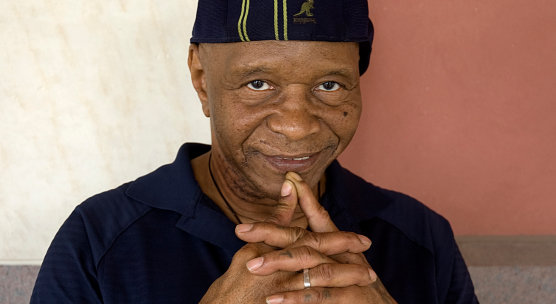‘Struggle and Revolution in the USA’s Criminal “Injustice” System’ – civil rights campaigner to visit Dundee
Published On Tue 8 Sep 2015 by Grant Hill

Civil rights campaigner Robert King, who spent 29 years in solitary confinement as a result of a miscarriage of justice, will visit the University of Dundee next week to talk about what he sees as injustice and prejudice built into the US penal system.
At a time when the Black Lives Matter campaign has focused the world’s media attention on alleged institutional racism of America’s criminal justice system, Robert King will draw on his own extraordinary experiences as one member of the ‘Angola 3’ to explore the country’s racial, social and political context. He will be appearing at the University’s Dalhousie Building on Wednesday, 16th September.
The US incarcerates more people than any other country, a disproportionate amount of who are African Americans. From chattel slavery to the supermax prisons of today he will challenge the principles upon which the prison-industrial complex is founded and give a first-hand account of the part that activism plays in the continuing struggle for prison reform and human and civil rights.
The event is being organised by Dr Zoe Colley, a Lecturer in American History at the University and author of, ‘Ain't Scared of Your Jail: Arrest, Imprisonment, and the Civil Rights Movement’.
“The case of the Angola 3 goes right to the heart of the injustices of the US criminal justice system,” said Dr Colley. “After his release in 2001, Robert King dedicated himself to exposing the fact that the three men were convicted to silence their criticisms of the prison system. Having spent 29 years in a solitary confinement cell measuring six foot by nine foot, he has campaigned against the systematic use of solitary confinement in the country’s prisons.
“America has the world’s highest incarceration rate, with 5 per cent of the global population but 25 per cent of all prisoners worldwide. In the years since the conviction of the Angola 3, racial disparities in arrest and sentencing have grown ever-wider. Prison reform remains one of the most pressing challenges in the US today.
“Given the high-profile deaths of African-Americans at the hands of the police over the past year and the subsequent Black lives Matter movement that has resonated across the globe, Robert’s visit could not have been timelier. His experiences are enlightening and harrowing in equal measures.”
In 1970, Robert King was imprisoned in the notorious Angola Penitentiary in Louisiana, USA. While incarcerated, he formed a prison chapter of the Black Panther Party with fellow inmates Herman Wallace and Albert Woodfox. Together, they organised the predominantly black prison population to protest segregation, corruption, racism and abuse.
In 1972, the three men were targeted for their activism. Wallace and Woodfox were convicted of the murder of a prison guard; it was later revealed that the main eyewitness had been promised his freedom by the warden in exchange for testifying. Robert King was charged with the murder of another Angola prisoner and convicted by an all-white jury. The men became known as the Angola 3.
Since his release in 2001, King’s life’s focus has been to campaign against abuses in the US criminal justice system, against the cruel and unusual use of solitary confinement and for the freedom of his fellow members of the Angola 3. Wallace died days after his release in 2013 but Woodfox is now serving his 43rd year in solitary confinement. In June 2015, Woodfox’s conviction was overturned for the third time by a federal judge and his release ordered. Louisiana authorities immediately announced their plans to retry Woodfox. He remains incarcerated.
Globally, politicians and NGO’s have cited the case of the Angola 3 as a gross miscarriage of justice, with Amnesty International stating that the long-term use of solitary confinement is a violation of the US Constitution and international human rights treaties.
‘Struggle and Revolution in the USA’s Criminal “Injustice” System’ takes place at 6pm on Wednesday, 16th September in the Dalhousie Building, Old Hawkhill. Free tickets are available from events@dundee.ac.uk, www.dundee.ac.uk/tickets or 01382 385564/385108.
For media enquiries contact:
Grant Hill
Press Officer
University of Dundee
Nethergate, Dundee, DD1 4HN
TEL: 01382 384768
E-MAIL: g.hill@dundee.ac.uk
MOBILE: 07854 953277